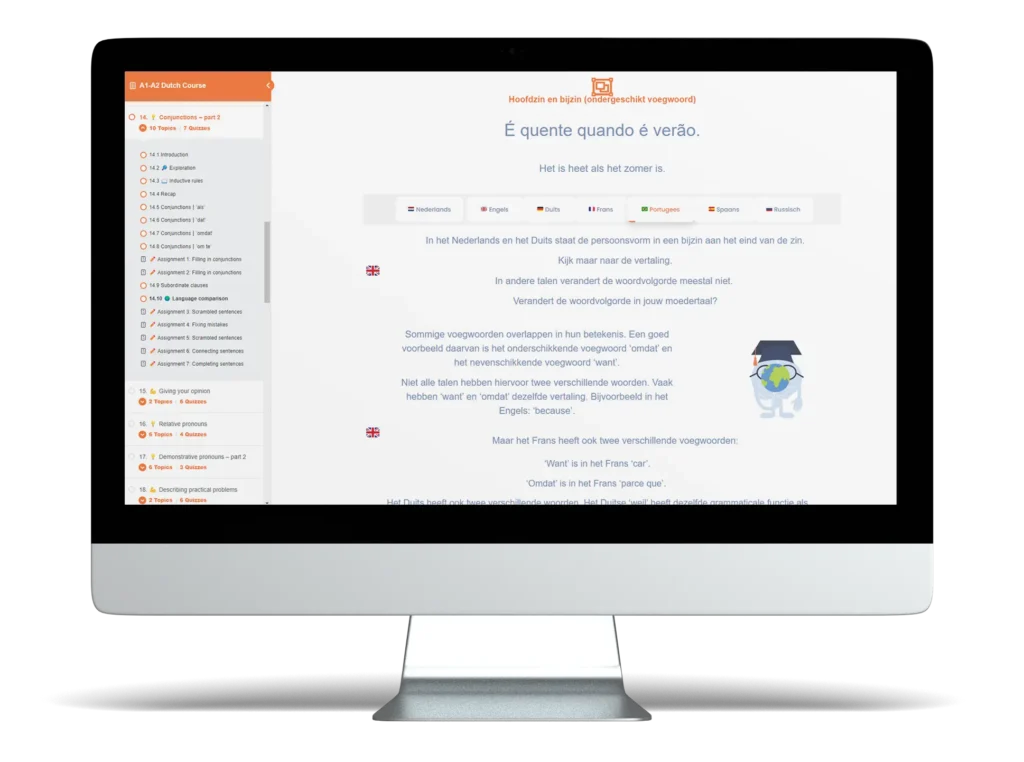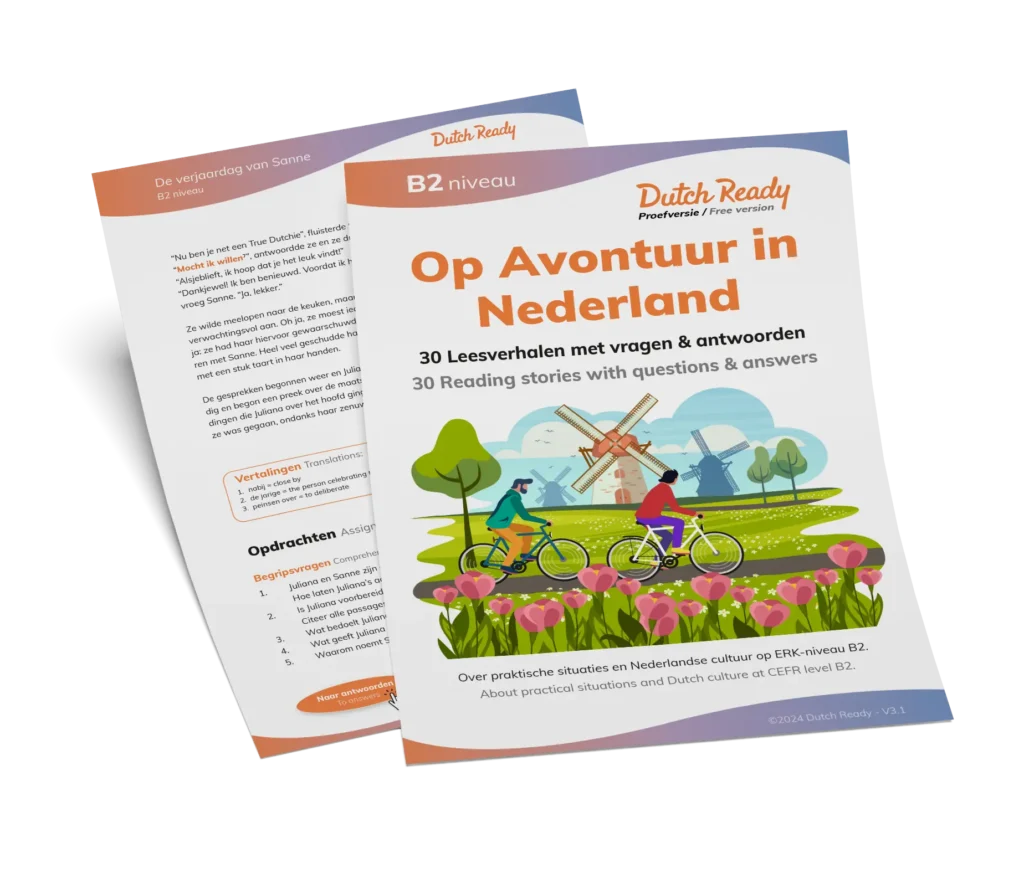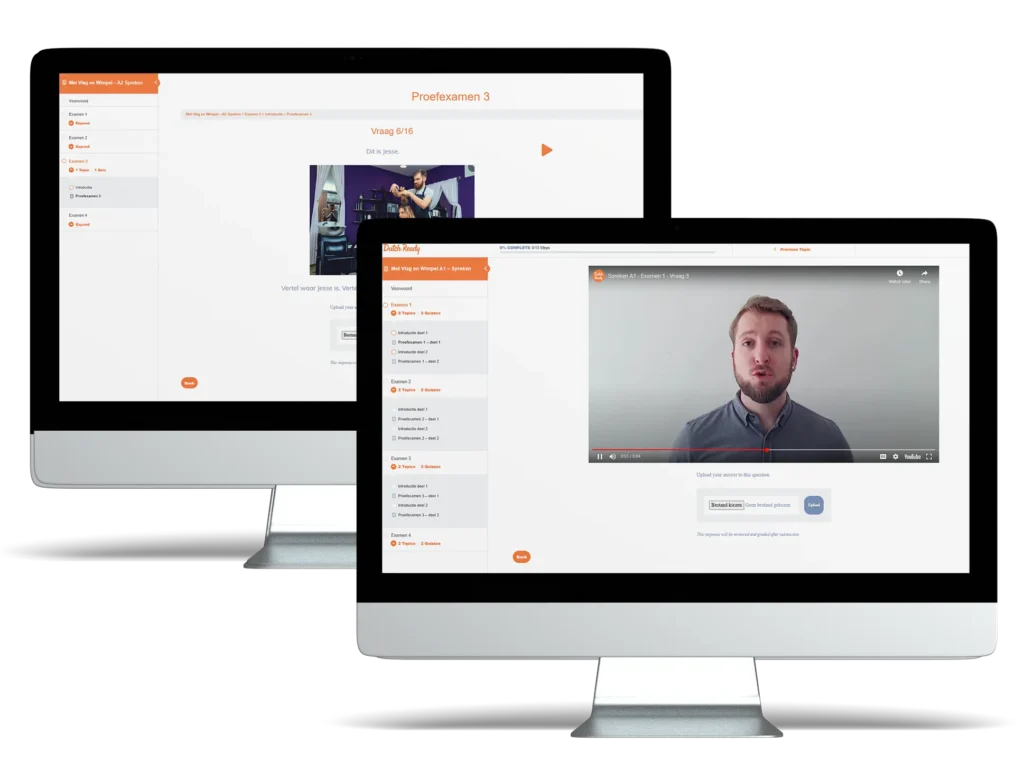Top reasons to support Dutch language lessons for expats
In today’s increasingly globalized workforce, effective communication stands as a cornerstone of success. As businesses expand their reach and embrace diverse teams, the ability to communicate fluently in the local language becomes more and more important. For employers in the Netherlands, investing in Dutch language training for expats is not merely a kind gesture; it’s an essential strategy that can enhance collaboration, boost employee morale, and drive overall organizational performance, amongst others. Even in a multicultural and expat-welcoming environment, the demand for language proficiency in Dutch grows.
In this blog, we explain to you how investing in Dutch language lessons for expats can contribute to your organization’s long-term success.
Dutch as the key to connection
Jamila, a talented marketing executive from the United Kingdom, has recently joined a Dutch company. Despite her expertise, she has not yet mastered the Dutch language. One day, Jamila is tasked with delivering a crucial presentation to a potential client. In the conference room, she notices the client speaking Dutch, building rapport with the rest of the team. When it’s her turn to present, Jamila struggles to articulate her ideas clearly, relying heavily on her English slides. Fumbling over words and phrases, the client’s lack of comprehension leads to awkward pauses and confusion, ultimately undermining her message.
Expats don't always voice their language needs
Situations like these are unpleasant for all parties involved. Jamila, especially in this situation, wants nothing more than to master Dutch. The fact is, she represents many employees from diverse cultural backgrounds who often find it difficult to voice their needs, such as requesting language lessons from their employers. While they may feel a pressing need for support in mastering the local language, the fear of seeming inadequate or coming across as greedy can prevent them from asking for help. Expats may slowly get used to the typical Dutch directness and working culture, but expressing their own needs and wishes often feels like a bridge too far.
Why should you provide expats with Dutch language lessons?
How language training benefits Jamila’s career is crystal clear. It will provide her with the confidence, growth and professional opportunities that she undoubtedly has in mind. Also, it enhances her ability to connect with colleagues and clients. Moreover, it helps her adjust and settle in her new country. In other words: Dutch language training is the key to a pleasant professional and personal life. But what’s in it for you as an employer?
1. Improved communication and collaboration
Communication is the key to success. It may sound trite, but it really is true. English may be the world’s lingua franca, but according to experts local languages open doors to deeper connections, smoother communication and a stronger sense of belonging. Even in an international working environment where English is the working language, Dutch employees will tend to continue speaking Dutch with each other. This is especially true in social moments, such as at lunch, Friday afternoon get-togethers and company parties. Unintentionally, groups will soon form within a team, making expats feel excluded.

Promoting a sense of unity
When asked, many expats admit to feeling somewhat isolated and disconnected, especially when they have just moved abroad. As an employer, you can promote a sense of unity by offering different opportunities, one of them being Dutch language lessons for expats. As early as CEFR language level A2, an employee is able to have simple conversations about everyday life. A chat with colleagues at the coffee machine about hobbies, family or the past weekend won’t be so daunting anymore. In addition to communication with colleagues and between teams, communication with customers also improves. Lastly, with this level it is easier for an expat to understand (simple) work instructions and documentation.
Advanced language skills, stronger workforce
By advancing to higher CEFR levels, such as B1 or B2, expats gain the ability to handle more complex work-related tasks with confidence. They can actively participate in meetings, provide constructive feedback, and navigate detailed documents or policies. This not only improves their individual performance but also the team as a whole. Investing in Dutch language lessons for expats pays off by creating a more cohesive and effective workforce. Dutch Ready offers Dutch language lessons for expats at every level.
2. Increased performance and productivity
When expats speak Dutch, their performance at work often improves significantly. They find it easier to participate in discussions and share their ideas confidently, something that contributes to an enjoyable, creative work environment. Additionally, when clients speak Dutch, it is easier to assign expat employees to client-facing roles, as they can communicate more directly and build rapport. Knowing Dutch also allows expats to make more informed decisions, as they can understand a broader range of internal conversations and corporate documents in Dutch, as well as external sources.
3. Engagement and motivation
In addition to performance in itself, Dutch language lessons for expats contribute to a positive corporate culture. Expats who feel more comfortable in their workplace because of a (basic) knowledge of the language are also more willing to challenge themselves and take on new tasks.
Recruiting and retaining talented employees
Deciding to offer your expat employees Dutch language training? It pays off in another way, too. It will be more likely that expats commit to your company. In other words, you will be more successful in retaining talented staff. In addition to retaining talented staff, recruiting them also becomes easier. After all, they too appreciate the fact that you are willing to invest in their long-term happiness. Training opportunities are among the most interesting secondary employment conditions.
4. Happy people are happy employees
Like thousands of other expats, Jamila also left her home country for the Netherlands. For most, it can take some time to get comfortable. A Dutch language course contributes to self-confidence and bonding with the new country. As an employer, you may think “Surely that won’t affect performance in the workplace?” But in fact, nothing could be further from the truth. Several studies among academics who traded their homeland for another country found that a general feeling of unhappiness is linked to poorer performance and adjustment problems in the workplace. Unhappy expats also experience less bonding with their work.

5. Your company gets better at satisfying the needs of its customers
When your employees speak Dutch, it becomes easier to meet customer needs. The Netherlands scores highest on the global English Proficiency Index (EPI), but that doesn’t mean that everyone is as familiar with this language. Even so, while clients often do speak (fluent) English, many feel more comfortable expressing themselves in their native language. Additionally, speaking Dutch to them demonstrates goodwill and a commitment to cooperation, and that helps to build trust and stronger client relationships.
In-company Dutch lessons: traditional classroom versus online lessons
When considering in-company Dutch lessons for your expat employees, organizations have the option to choose between traditional classroom-based instruction and online learning formats. For employees who work remotely or have changing schedules, online lessons are ideal. These classes enable learners to participate from any location without the constraints of travel time. Hybrid teaching, where some students are present in a classroom and others dial in from a video call platform, is also a possibility.
Private Dutch lessons
Above, we were talking about in-company Dutch lessons, which take place in (small) groups. Of course, there’s more than just those. Private Dutch lessons allow for personalized attention and tailored instruction that aligns with each learner’s specific needs and goals. In a (face-to-face or online) one-on-one setting, the teacher can adapt the pace of the lessons, focus on particular areas of difficulty, and provide immediate feedback. All of this contributes significantly to an enhanced learning experience.
What to choose: in-company Dutch lessons for your team, or one-on-one lessons?
One-on-one lessons fit especially well when an employee needs more intensive guidance or wants to see results in an incredibly short period of time Private lessons allow for a personalized plan of action. Individual classes also tend to yield faster results, in part because they can be tailored to topics relevant to the employee and the employee’s native language. On the other hand, group in-company lessons have a social component and are more cost-effective. Click below to learn more about both.

Are you ready to break down language barriers?
By choosing the right type of language training – whether through traditional classroom settings or online lessons – you can meet the diverse needs of your employees. Take your time to see what Dutch Ready has to offer you with a range of tailored programs designed to elevate your workforce’s language skills and, ultimately, your organization’s success. Together, let’s break down language barriers and build a more inclusive, effective, and motivating workplace.
Do you have any questions? Take a look at the FAQs below, or fill in the contact form on our website to receive customized advice on Dutch language classes for your expat employees. Don’t hesitate to get in touch, we’re happy to provide you with the clarification needed.
Frequently asked questions
When does my staff reach the necessary level of Dutch fluency?
This depends on each individual’s available time and language learning challenges. For private Dutch lessons, we offer a personal intake and level testing at the start of the course (and during the course upon request), and a certificate of completion can also be provided if requested.
What do Dutch language lessons for expats cost?
The total cost depends on the learning format, as well as on the number of lessons (or duration of self-study) you and your employees would choose. Feel free to get in touch with us with questions about pricing.
When can my expat employees get started with Dutch lessons?
Do you choose guided Dutch lessons (private or in-company) for your employees? Then we will pair your employee(s) with one of our experienced teachers. For private Dutch lessons, a test lesson is part of that procedure. It usually takes no longer than a few days to find a match and get started.




















